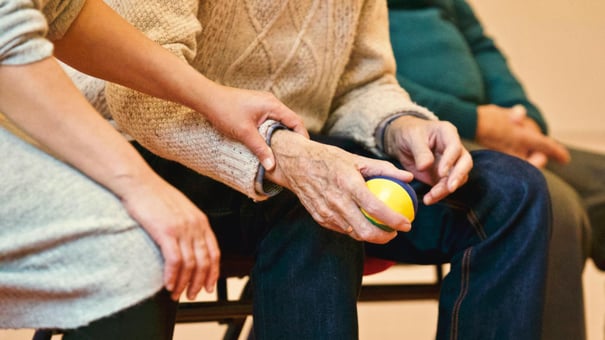The holidays are approaching, and with them come plentiful opportunities to gather with friends and family. This is also a time when adult children might notice changes in their older parents – changes that indicate they may need help beyond what they can provide for themselves.
This holiday season, as you’re making plans to visit with older loved ones, keep in mind some telltale signs that they may be experiencing difficulties that require attention and perhaps a change in care needs.
Diminished Mobility
 Faltering mobility is a common incidence among older adults, one that is responsible for serious injury and even death. In fact, falls are the leading cause of injury-related death in the U.S. among adults 65 and above. If you witness your loved one struggling to stand from a seated position, climb stairs or walk securely, these are signals that they could be headed for a devastating fall. If you see bumps, bruises or scrapes on them, it’s likely that they’ve already taken a dangerous tumble.
Faltering mobility is a common incidence among older adults, one that is responsible for serious injury and even death. In fact, falls are the leading cause of injury-related death in the U.S. among adults 65 and above. If you witness your loved one struggling to stand from a seated position, climb stairs or walk securely, these are signals that they could be headed for a devastating fall. If you see bumps, bruises or scrapes on them, it’s likely that they’ve already taken a dangerous tumble.
Memory Impairment
Over a certain age, some memory loss is normal and expected. Mild shrinkage, reduced blood flow and a decrease in proteins that support brain cells are changes in the brain that commonly occur with age. But if your loved one seems confused performing once-familiar tasks, has considerable trouble following conversations, regularly misses appointments, gets lost in or outside the home or has difficulty learning new things, their cognition may be significantly affected.
Self and Home Neglect
Poor hygiene, remiss home/yard maintenance and skipped or low-quality meals are all indications that one cannot care for themself or their home as they once did. If Mom is normally well-groomed and appears disheveled or improperly dressed, if you notice unpleasant bodily odors, she may be physically or mentally unable to tend to everyday personal cleanliness. If Dad has heaps of laundry, spoiled food or dirty dishes lying around, if the grass is overgrown, he may be overwhelmed by the duties of homeownership. What’s more, when healthy meal preparation becomes too much to manage, malnutrition becomes a threat, manifesting in uncharacteristic weight loss, frailty, fatigue or weakness.
Social Withdrawal
It’s not uncommon for older adults to experience a shrinking social circle as friends move away, become immobile or pass away, but it’s important to recognize when this natural shift turns into social withdrawal. Signs that your senior loved one may be socially withdrawn include a noticeable lack of interest in phone calls, family gatherings or previously enjoyed social activities. They may stop leaving the house altogether, express feelings of loneliness, depression or hopelessness or seem indifferent about maintaining friendships. While some solitude is normal, especially after loss, consistent disengagement from social contact can signal deeper emotional or mental health concerns that shouldn’t be overlooked.
Persistent Health Issues
Many older adults experience chronic health conditions that can significantly impact their independence, particularly when these conditions interfere with daily functioning. Common issues include arthritis, which can limit mobility and dexterity, and cardiovascular diseases, which reduce stamina and physical capacity. Additionally, older adults are more susceptible to frequent urinary tract infections (UTI’s) and viral infections due to a weakened immune system. Vision loss from conditions such as macular degeneration or glaucoma can make it difficult to read, drive or navigate safely, while hearing loss can hinder communication and increase social isolation. If your loved one is beset with a chronic health condition(s) that inhibits their ability to function on their own, it may be time to consider outside assistance.
Mishaps and Misjudgments
Other signs that your relative may need help are a bit more subtle, but no less revealing. Take note of any of the following:
- Medication missteps. Proper intake of medication requires fine motor dexterity as well as the cognitive capacity to know which medicines to take on which days, at which times and how often. Forgotten, skipped or too many doses could have dire, if not deadly, consequences.
- Money mismanagement. Unpaid bills, late payment notices, bounced checks and/or unusual purchases are all red flags, especially if your loved one is normally on top of their financial matters.
- Easily misled. The elderly are prime targets for fraudulent scams. If your senior is falling for such cons or seems uncharacteristically vulnerable to them, it may be a sign of cognitive decline or even loneliness.
- Driving mishaps. Dents, scrapes, fender-benders…these are not “minor” incidents; they are clues that your family member is potentially engaging in unsafe driving behavior that could be perilous to themselves and others.
- Social miscues. Comments, gestures or behaviors that are not normal for your senior should not be taken lightly. These, too, are signs that something is amiss.
The holidays are a time of connection and, for some families, long-awaited reunion. This season also offers a unique opportunity to observe changes in aging parents that might go unnoticed during phone calls or shorter visits. Recognizing these changes early can help open the door to important conversations and, if necessary, the support your loved one needs.





